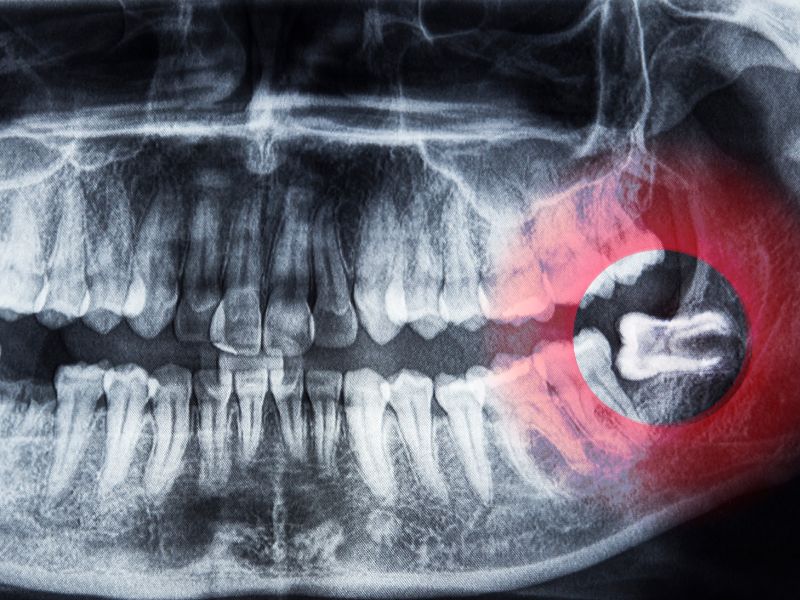Why Should I Have My Wisdom Teeth Removed?

Wisdom teeth are a relic from a bygone age that lurk in the recesses of our mouth and often wreak oral health havoc. We call them wisdom teeth because they appear in the late teens or early 20s, when we’re supposed to start gaining wisdom as we mature into adulthood.
They may or may not be harbingers of increasing knowledge and understanding of the world around us. But one thing’s for sure. In many cases, wisdom teeth herald a world of dental trouble. This is why oral surgeons in Des Moines extract wisdom teeth as a preventive measure as well as to correct issues that have already developed. If you have problem wisdom teeth and are wondering whether they need to come out, you should consider what may happen if you allow them to continue to cause trouble.
Problems Wisdom Teeth Cause
If you’re lucky, your wisdom teeth will present no problems and won’t need taking out. Unfortunately, this doesn’t usually happen. Most of us don’t have enough room in our mouth for these molars. So they fail to erupt properly through the gum.
Wisdom Teeth Impaction
Wisdom teeth often only partly emerge or remain lodged completely beneath the gum line (impaction). This can damage jaw bone, nerves, and other teeth. Sometimes they grow in at a skewed angle, which can cause orthodontic problems from tooth crowding.
Wisdom Teeth Complications
Complications caused by wisdom teeth can lead to general health issues. You may get headaches, for instance. And infection from a wisdom tooth can travel via the bloodstream to other areas of your body.
Oral Health Issues
You can also get problems with wisdom teeth that emerge properly. Their position right in the corners of the mouth make them a magnet for food debris and bacteria. And they’re difficult to reach with your toothbrush to clean effectively. This increases the risk of tooth decay and gum disease.
Signs Your Wisdom Teeth Need Removing
There are several signs that wisdom teeth need to be removed. They include:
Pain from Infection
Persistent pain or sensitivity in the back of the mouth is the most obvious symptom of wisdom teeth issues. An impacted wisdom tooth, for example, can cause severe discomfort by putting pressure on the gum that causes infection and inflammation. Partially erupted wisdom teeth may leave a gap where bacteria can accumulate, resulting in an infection called pericoronitis. You might also notice you’ve developed persistent bad breath (halitosis) or an unpleasant taste in the mouth. The longer you delay wisdom teeth removal, the worse the pain from infection will get.
Gum Problems
Wisdom teeth infection can cause swelling and reddening along the gum line, and your gums may also start to bleed when pressure is applied. This is not only painful but also makes it difficult to brush your teeth properly, which can lead to further infection from an accumulation of bacterial plaque.
Jaw Stiffness
Problem wisdom teeth can crowd adjacent teeth. This can lead to stiffness in the jaw due to misalignment as your upper and lower teeth fail to come together properly. You may have difficulty opening and closing your mouth and also get neck pain and headaches. If wisdom teeth push other teeth out of position, orthodontic treatment may be necessary to correct the problem.
Sinus Problems
The roots of upper wisdom teeth can put pressure on nearby sinuses behind the nose. This can cause congestion and possibly a painful infection of these air-filled cavities, making it difficult to breathe.
Cysts
Fluid-filled sacs known as dentigerous cysts can develop in jawbone and soft tissue around wisdom teeth that haven’t fully emerged.
The Wisdom Teeth Extraction Procedure
The idea of having your wisdom teeth pulled may be disconcerting. Worries usually arise through lack of understanding about the procedure. So, this is what you need to know about wisdom teeth removal. In some cases, wisdom teeth can be extracted with a simple, non-surgical procedure. In more complex cases, surgery is required, especially if a tooth has become rooted in jawbone. Wisdom tooth surgery is performed with local anesthetic to numb the area or sedation anesthesia or general anesthesia to suppresses consciousness.
The surgical procedure typically entails:
- Making an incision to expose the tooth and bone.
- Removing some bone to facilitate extraction.
- Extracting the tooth. Sometimes this needs to be done piece by piece.
- Cleaning up the tooth and bone.
- Replacing tissue and stitching the surgical wound.
- Applying a dressing to aid blood clotting.
Recovery After Wisdom Teeth Surgery
Recovery time after wisdom teeth surgery is generally two weeks, but it can take three to six months before jawbone and soft tissue heal completely. Medication can be prescribed to manage post-surgery discomfort. If you had non-dissolvable sutures, these will be removed about a week after the procedure.
The First 24 Hours
During the first 24 hours after wisdom teeth extraction, you shouldn’t eat hot, hard, sticky, or spicy foods. Hot drinks, alcohol, and caffeinated or carbonated drinks should also be avoided.
Other measures that will help healing during this time include:
- Not brushing your teeth or rinsing your mouth.
- Drinking plenty of water.
- Avoiding use of a straw – the sucking action can hinder blood clotting.
- Avoiding excessive spitting, which can also dislodge the blood clot.
- Using an icepack to ease swelling.
Wisdom Teeth Removal by Des Moines Oral Surgeons
Wisdom teeth are routinely extracted because they often cause multiple problems. And you don’t need them anyway. Wisdom teeth are regarded as vestigial organs that serve no purpose. General dentists can handle simple wisdom teeth removal, but Des Moines Oral Surgeons PC are experts in wisdom teeth surgery. They’re also trained in administering sedation and anesthesia medication, including general anesthetics.
Even if your wisdom teeth are currently causing no issues, they may well do so in the future, when extraction can be problematic. This is why it’s best to remove wisdom teeth sooner rather than later. Wisdom teeth extraction is generally easier when you’re younger and tooth roots aren’t yet fully developed. This means less damage to surrounding tissue during the extraction procedure and faster healing and recovery.
If you think you may need your wisdom teeth removed, contact us to schedule a consultation.











